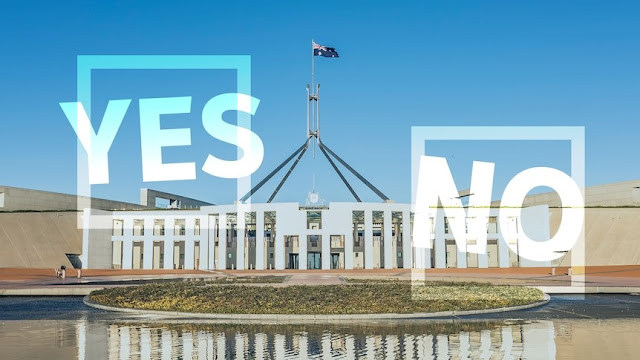---------oOo---------
Unless in a coma for months, people in Australia will be aware that this weekend is the date for compulsory voting in the referendum for The Voice in Parliament constitutional change.
For those overseas or who have been in comas:
- Voters will be asked to vote yes or no to recognising Indigenous people in the constitution1 by establishing a Voice to Parliament.
- The Voice to Parliament was proposed by First Nations people based on a lengthy and widespread consultation process about the best way to achieve constitutional recognition of Indigenous people in Australia.
- The Voice would be an independent advisory body. The members of the Voice would be made up of and chosen by First Nations people from communities around Australia.
- Under the constitution, the government already has the power to make laws for Indigenous people. The Voice would be a way for them to be consulted on those laws.
It has been divisive, controversial and created wars of words. No doubt it will be even more so if rejected.
For a referendum to be successful and the alteration to the constitution to be passed, a double majority vote must be achieved, which is:
- a majority of voters in a majority of states (at least four of the six states); and
- a national majority of voters (an overall YES vote of more than a 50 per cent).
Australia has had a total of 44 nation-wide referendums since 1901, some of which have been held at the same time with a number of different questions being asked. Eight of these have been successful.
The 1999 referendum to establish Australia as a republic was not passed.
---------oOo---------
Some origins of related words . . .
__________
Referendum:
A referendum is a direct vote by the electorate on a proposal, law, or political issue. This is in contrast to an issue being voted on by a representative. This may result in the adoption of a new policy or specific law, or the referendum may be only advisory. In some countries, it is synonymous with and also known as plebiscite, votation, popular consultation, ballot question, ballot measure, or proposition.
The word dates from1847, in the context of "a submitting of a question to the voters as a whole", originally chiefly in reference to Switzerland, where the people have the right to decide on certain laws which have been passed by the legislature.
It comes from French or German, fin turn from Latin referendum "that which must be referred," literally "thing brought back."
General (non-Swiss) use dates from 1882.
__________
Vote:
As a noun, the word vote dates from the mid-15th century, a formal expression of one's wish or choice with regard to a proposal, candidate. This comes from the Latin votum "a vow, wish, promise to a god, solemn pledge, dedication.”
As a verb it is also from about the mid-15c, meaning to "give a vote to."
__________
Politics and politicians:
From the Greek ‘poly’, meaning many, and ticks, meaning bloodsucking parasites.
Nahh, that isn’t correct.
The English word politics has its roots in the name of Aristotle's classic work, Politiká, which introduced the Greek term politiká ('affairs of the cities'). In the mid-15th century, Aristotle's composition would be rendered in Early Modern English as Polettiques which would become Politics in Modern English.
__________
Indigenous:
Indigenous is used in scientific contexts to describe organisms and the habitats to which they belong, and in expressly non-scientific contexts, as in "emotions indigenous to the human spirit." Most often, however, it's used to describe the native inhabitants of a place.
Indigenous derives from the Latin noun indigena (meaning "native"), which was formed by combining Old Latin indu (meaning "in" or "within") with the verb gignere (meaning "to beget").
The word ‘indigenous’ was first used officially by the United Nations in 2002 in its political declaration of the World Summit on Sustainable Development. Prior to this time, the term was regarded as ‘still under debate’ for use in UN official documents.
The Australian Government still uses the term ‘Aborigine’ and ‘Aboriginal societies’, as well as ‘Indigenous peoples’.
The question on the referendum ballot paper will be:
“A Proposed Law: to alter the Constitution to recognise the First Peoples of Australia by establishing an Aboriginal and Torres Strait Islander Voice.Do you approve this proposed alteration?”
This the text proposed to be inserted into the Constitution:
“Chapter IX Recognition of Aboriginal and Torres Strait Islander Peoples129 Aboriginal and Torres Strait Islander VoiceIn recognition of Aboriginal and Torres Strait Islander peoples as the First Peoples of Australia:there shall be a body, to be called the Aboriginal and Torres Strait Islander Voice;the Aboriginal and Torres Strait Islander Voice may make representations to the Parliament and the Executive Government of the Commonwealth on matters relating to Aboriginal and Torres Strait Islander peoples;the Parliament shall, subject to this Constitution, have power to make laws with respect to matters relating to the Aboriginal and Torres Strait Islander Voice, including its composition, functions, powers and procedures.”


No comments:
Post a Comment
Note: Only a member of this blog may post a comment.